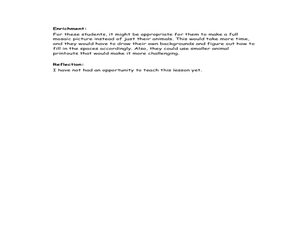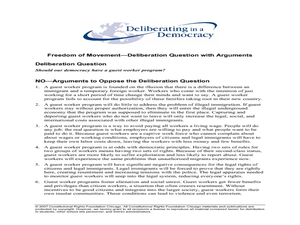Curated OER
Wales: An Interdisciplinary Unit
Young scholars practice basic map and geographic skills as they compare Oregon to Wales. Students color map of Wales and Oregon using color codes to distinguish between land, water, and bordering nations or states, listen to stories and...
Curated OER
If the World Were a Village Activities
Sixth graders complete activities about the book If the World Were a Village by David J. Smith. For this interdisciplinary lesson, 6th graders complete a math activity converting fractions into decimals and percentages and a geography...
Curated OER
Superpowered Interdisciplinary Projects: Using the Science in Saturday Morning Cartoons
How to leverage cultural background knowledge to increase student investment.
Curated OER
Amazing Alphabet Lessons to Excite Your Little Learners
Wiggle, create, and recognize! Fun and engaging activities to reinforce phonemic awareness and pre-reading skills.
Curated OER
Interdisciplinary Unit Planning II
Students create playground maps and identify means of using these maps to enhance social studies learning of elementary students. They develop elementary-level interdisciplinary unit plans using social studies content for the primary...
Curated OER
It's Census Time: Census Lesson Plans
Census lesson plans can provide an interdisciplinary look at how the data is used, and what it means for everyone.
Curated OER
Social Studies Lesson Plans With Science Connections
There are great social studies lesson plans that can help students make historical connections to science.
Curated OER
Michael Jackson Lessons: A Cross-Curricular Experience
By learning about Michael Jackson through these lesson plans, students can explore history, science, math, etc . . .
Curated OER
Interdisciplinary Approach to Investigating Popcorn
Students conduct a lab experiment using the scientific method. In this interdisciplinary lesson plan, students will test the difference in popping white and yellow corn. Students will write their lab report in their science, math,...
Curated OER
Art Lesson Synthesis
Students observe animals and complete an art project. In this interdisciplinary lesson, students define the word mosaic, create animal mosaics, and share their creations with the class. As students explain their art to the class they...
Federal Reserve Bank
Journey to Jo’burg: A South African Story
How did South African apartheid affect the ability of people of color to increase their human capital? Here is a rich lesson in which learners come to understand the relationship between investment in human capital and income, while also...
Curated OER
“THE LORAX” by Dr. Seuss
Few children's books convey the message of conservation as well as Dr. Seuss' The Lorax. Read the story aloud, emphasizing the interconnectedness of plants and animals in an ecosystem and discussing different ways people can help the...
Deliberating in a Democracy
Freedom of Movement
Class members examine human migration. For this population lesson, they read an article entitled, "Freedom of Movement" and respond to discussion questions about the article related to guest worker programs.
Baylor College
We Need Water
There's nothing quite like a glass of ice-cold, freshly squeezed lemonade. Lesson seven of this series explains how the water humans need to survive can come in many forms. Teach your class about how much water humans require every day...
Population Connection
Lessons From the Lorax
Is progress progressing too fast? So believes the Lorax, the eponymous character from Dr. Seuss's The Lorax. Young environmental science students read the book and debate the arguments of the Lorax and the Once-ler regarding the value of...
American Battlefield Trust
Creating a Historic Site Lesson Plan
What makes a place historic? Using events from their own lives, learners consider this question, then deem places from their world historic. They then curate the experience for visitors, creating signs and other materials for their...
Curated OER
Whose Point of View? The Journey of Three Generations
A reading of Whale Journey, a fact-filled picture book by Vivian French, launches a study of the life cycle and migration of three generations of gray whales. The interdisciplinary lesson offers opportunities extensions into all subject...
MENSA Education & Research Foundation
I Need a Superhero
Once the class learns about the hero's journey, they'll find it in every story and movie they see! Take characters from their humble beginnings to their atonement and apotheosis with a set of lessons about the hero's journey focusing...
Berkshire Museum
Where’s the Water?: Acting Out Science Cycles
Young scientists transform themselves into rivers, oceans, clouds, and drops of water in order to explore the water cycle. After assigning and explaining to students their different roles in the activity, the teacher reads aloud a...
SRI International
Nanofiltration
How can everyone in the world have access to clean drinking water? Throughout the lesson, learners read about and listen to how water is filtered, what the filtration process removes, and the best ways to filter. They explore the...
Scholastic
Recovery From Drug Addiction
Are there factors that put some individuals at a higher risk for drug addiction than others? Learn more about the risk factors that may make some people more susceptible to addiction, as well as protective factors that help prevent...
Curated OER
Active Reading with American History
Explore connections within and between informational texts with this lesson about encyclopedia articles. Middle schoolers write encyclopedia articles focusing on topics in American history. They discuss how to determine credibility...
Environmental Protection Agency (EPA)
How Much Water Do You Use?
Incorporate reading strategies, math, research, and the scientific method into one lesson about water conservation. After reading a story about a landlady trying to determine how many people are living in an apartment, learners develop a...
Curated OER
1900 America: Primary Sources and Epic Poetry
Using Walt Whitman's Song of Myself and Hart Crane's The Bridge as models, class groups first craft their own epic poems for 1900 and, using primary sources, create a multi-media presentation that captures the sights and sounds of life...

























